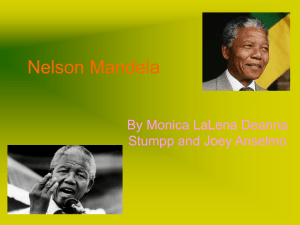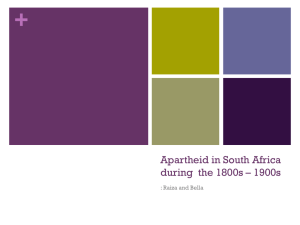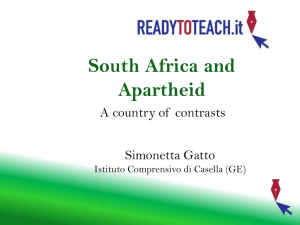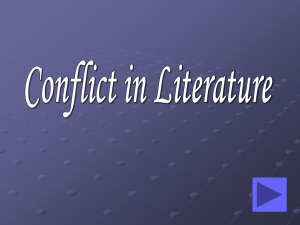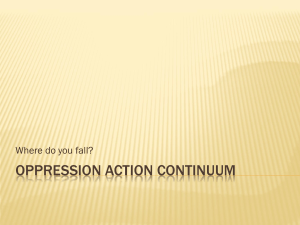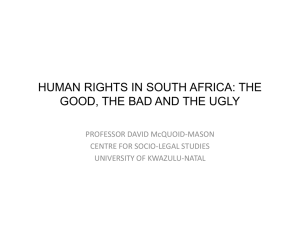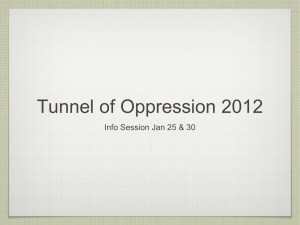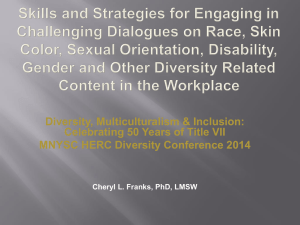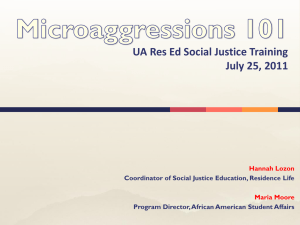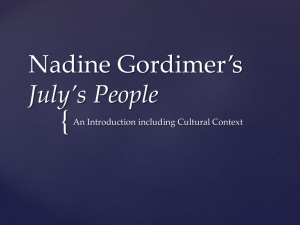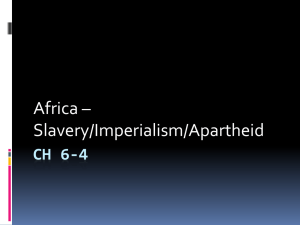Linda Smith S Africa SWAN conf2011
advertisement
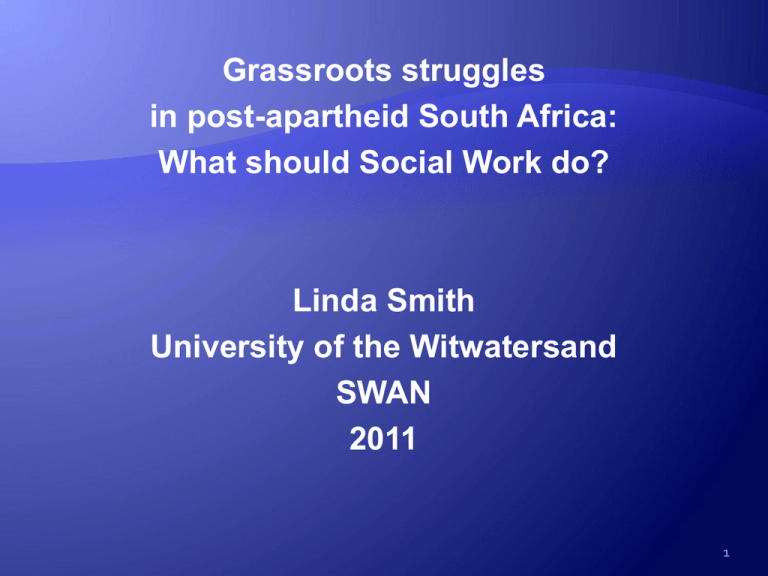
Grassroots struggles in post-apartheid South Africa: What should Social Work do? Linda Smith University of the Witwatersand SWAN 2011 1 South Africa, the nation that has given Nelson Mandela to the world, is seen as the beacon and icon of successful transformation from racist Apartheid to a free non-racist society with one of the most progressive constitutions globally. Or not?... We need to ask: “how does social work respond”? As we speak, a new crisis has unfolded – the death of Andries Tatana, an educator of young people and committed citizen - during service delivery protests in Ficksburg in the Free State, on Wednesday. He was beaten to death by six policemen. The crime is not only in the terrible police brutality, but also in the open declaration of class war against the masses. 2 Visuals of current South African realities 3 4 5 6 7 8 9 10 11 INTRODUCTION South African social work, as social work the world over, needs to ask: “Are we as social workers contributing to or hindering the struggle for social justice and a better world?” Our leitmotief is that of Pursuing social justice and being a human rights profession, but we continually perform social control functions which maintain the status quo. Many reasons cause us to fail in our purpose – fear of disfavour from our employers or the state, the discomfort of challenging our own distorted ideologies, or even the discomfort of continual awareness about injustice and oppression 12 SOUTH AFRICAN CONTEXT OF STRUGGLE During apartheid, the struggle for social justice and equality became subsumed by the project of political emancipation The end of Apartheid brought freedom and equality in the ideal rather than the material. Statutes and policies are transformed, but society remains largely untransformed. SA society still stratified by race and class: 40 – 50% people regarded as poor (May and Meth, 2007). Levels of inequality are greater than ever before, with one of the highest Gini Co-efficients in the world SA among the 50 wealthiest countries, but appears 115th out of 175 in social indicators and has shown a decline in the Human Development Index 13 SA ‘s shift from RDP (Redistribution and Development programme based on the Freedom Charter) to GEAR in 1996 was the ANC Government’s response to pressures of World financial institutions (IMF, World Bank); ‘Tutelage’ of African states (Bond, 2005) Global neoliberal capitalism dictates the path of social change and macro economic policies such as GEAR (Growth Employment and Redistribution policy) sees the market as the template for solving problems Neo-liberalism exists in complex entanglement with the post-colonial (i.e. the ongoing effects of colonial exploitation, extraction and oppression) and may even be seen as a continuation of historical colonialism evidenced by global resource consumption and wealth distribution (Pollack and Chadha, 2004) 14 COMMUNITY STRUGGLE Communities increasingly desperate about poor municipal service delivery and unfulfilled promises South Africa’s Andile Nxitama, a new young black consciousness leader and the organiser of the radical “September National Initiative”, argues that it is the ANC which is to blame for this death – reminiscent of the death by the apartheid regime of Hector Petersen in the 1976 Soweto uprisings He states: “ Township life is hellish – it is characterised by mass poverty, government neglect, violence, hopelessness, overcrowding and hunger.” A recent initiative is a mass consciousness raising campaign led by a pastor in Khayelitsha, Cape Town called “Welcome to Hell” 15 SOCIAL WORK STUDENTS VICTORY APRIL 2011 Scholarships to Universities for social work students cut Payments for meals excluded!! Some SW students decided enough was enough… And so a programme of social activisim and organisation of all students was initiated among three Universities in the area. This was support ed by Student Representative Council s and staff of he Department (resources, participation) Petitions, requests for meetings with Minister of Social Development, resistence, written demands and threatened hunger strike Victory after two months yesterday. Scholarship restrored 16 Social change and transformation requires revolution and revolutions are the doing of ‘the masses’. Trotsky, in his preface to “The history of the Russian revolution” (1930) refers to the insertion and interference of the masses as being the critical ‘moment of revolution’: “The most indubitable feature of a revolution is the direct interference of the masses in historical events....at those crucial moments when the old order becomes no longer endurable to the masses, they break over the barriers excluding them from the political arena, sweep aside their traditional representatives, and create by their own interference the initial groundwork for a new régime… The history of a revolution is for us first of all a history of the forcible entrance of the masses into the realm of rulership over their own destiny.” 17 Social movements, old and new, have played a critical role in the SA context – then, during the anti-apartheid liberation struggle and now, in the anti-capitalist, anti-poverty movements Currently, organizations such as o Abahlali Basemjondolo (shack dwellers movement) o Anti-Privatisation Forum o Anti-eviction campaign o Welcome to Hell campaign (Western Cape) o Service delivery protests throughout the country are expressions of ‘intolerable grievances’, resisting oppression, neo-liberalism and inequality. It is at the point where such grievances become defined as “unendurable”, that people begin organizing And so we must turn to such social movements in Freirian (1970) praxis, to reflect, act and institutionalize our knowledge development 18 Scenes in South Africa today are reminiscent of the 1980’s… however, the apartheid struggle around racial oppression is replaced by class oppression… 19 South African shack dwellers’ movement http://www.abahlali.org 20 SOUTH AFRICA AND THE PROJECT OF COLONIALISM SA colonised by the Dutch in 1652. This colonial and imperialist project was one of merchant capitalism. Aime Cesaire, an important anti-colonial writer states: “It is not evangelization, nor a philanthropic enterprise, nor a desire to push back the frontiers of ignorance, disease, and tyranny, nor a project undertaken for the greater glory of God, nor an attempt to extend the rule of law. To admit once and for all, without flinching at the consequences, that the decisive actors here are the adventurer and the pirate, the wholesale grocer and the ship owner, the gold digger and the merchant, appetite and force, and behind them, the baleful projected shadow of a form of civilization which, at a certain point in its history, finds itself obliged, for internal reasons, to extend to a world scale the competition of its antagonistic economies.” 21 (Cesaire, 1955, p. 33) It was this need for cheap labour, land and resources that drove the Dutch and British and then the Afrikaner nationalist government (after 1924), to the racist capitalist system expressed in Afrikaner nationalist Apartheid Apartheid worked very ‘successfully’ to achieve the capitalist project of entrenching white supremist wealth and domination, and extractive western corporate profit-making. But it was precisely the antagonism within these dominant forces – and the fact that the old order was “no longer endurable to the masses”, that led to the end of Afrikaner nationalism. South Africa’s particular form of racist capitalism succeeded in producing vast levels of race stratified inequality (Moeletsi Mbeki, 2009, p. 48) 22 The resistance movement and its struggle for liberation, gradually produced change guided by the 1950’s Freedom Charter – a socialist manifesto. This was the vision of the ANC until it took power in 1994. As labour union movement became more organized during the 1970s with the formation of COSATU (Congress of SA trade unions), there was an increase in force towards black labour by the state. This in turn led to increased pressure by major corporations on the SA government to withdraw apartheid policies. Why? Not for moral Anti-apartheid ideals – but because production and profits were threatened The dominance of race and ethnicity in SA politics contributed to a false sense that it was these ideologies rather than socioeconomic structures that determined political agendas 23 Liberal discourses see transformation as a project of human rights, rule of law, anti-racism and equal opportunity. All this should occur within the free-market, economic growth and maximization of profit with its trickle down of resources to the poor. And so the new SA adopts discourse around self help, socio-economic development, and self-reliance as its new mantra – of the state and… of social work and its new form – ‘developmental social work’. ‘Creating dependence’ on the state, through the provision of social security (at about 20 pounds per month for child support grants and about 100 pounds per month for old age and disability pensions) is considered dangerous The liberal-democratic project of freedom from racist discrimination, universal franchise, legislated equality, and non-racism, improved access to resources and opportunities and affirmative action to redress past discrimination, is being achieved. The project of a socially just, transformed society in which the dignity and quality of life of all is guaranteed, in both the material and the ideal, is far from achieved. 24 THE LEITMOTIF OF SOCIAL WORK The project of humanisation, social justice, equality and freedom from oppression, is claimed by social work to be its leitmotif. However, the sad truth is that social work often finds itself in a position of complicity with ongoing oppression, maintenance of the status quo, shoring up of skewed power relations or acquiescence (McKendrick, 1998; Dominelli, 2002; Patel, 2005; Sewpaul, 2004). Attempts to restore or nurture hope for the achievement of change are futile without critical consciousness and critical analysis of psychopolitical realities. Working towards social change in the Marxist real rather than the Hegelian ideal (Brown, 2001), may be found in a radical social work engaged with such critical analysis and conscientisation (Ferguson, 2008). 25 DISCOURSE OF POLITICS OF SOCIAL WORK THEORY (Payne, 2005, p. 8) Reflexive-therapeutic (Therapeutic helping) Individualist-Reformist (Maintenance of social order) Socialist-Collectivist (Emancipatory/transformational) 26 CRITICAL DISCOURSE IN SOCIAL WORK IN THE SOUTH AFRICAN CONTEXT We must revisit the explanatory power of our theories and reclaim our leitmotif of building a socially just, equal society free from oppression. SW must understand and support the dynamics of the revolutionary moment when the masses insert themselves into history and work for critical conscientisation to hasten the process whereby conditions become unendurable and intolerable Structural analysis must include an understanding of the entrenchment of racist capitalism during the apartheid era as well as the ‘entanglement’ of the postcolonial context We must reflect on the processes and dynamics of the New Social Movements for appropriate and new knowledge for social justice and change We must account for both the psychological and structural (psycho-social ) nature of racism, inequality and other forms of oppression – and thus for our ‘psychopolitical validity’ The taken for granted pedagogy of global neo-liberalism must be resisted A critical analysis and stance must be adopted in relation to dynamics of power and oppression and the way that these relations are perpetuated through hegemonic discourse – ongoing reflexivity and critical conscientisiation 27
